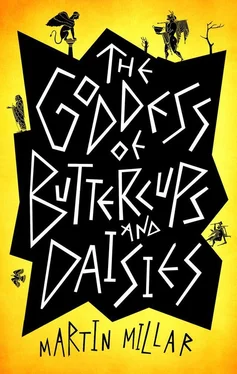‘Damn it,’ she muttered. She helped Aristophanes to his feet, put her arm round his shoulder to support him, then set off towards the tavern where she’d rented a room. She gritted her teeth as the wound in her shoulder began to sting.
‘Slow down,’ said Aristophanes, slurring his words.
‘We can’t slow down. Do you have to drink so much?’
Around Callias’s mansion the streets were beautifully tended. In the area where Bremusa had rented a room, they weren’t. They were cracked, muddy and treacherous. It made walking at night difficult, and potentially messy too, if you came across one of the open sewers. It took quite a long time to drag the intoxicated Aristophanes to the tavern. Bremusa’s mood, already bad, had worsened.
I don’t want to be looking after this fool. I want to hunt for Idomeneus.
Bremusa was heartened that she’d managed to wound him. She was aware, however, that as the fight progressed, he’d been driving her back. Though their fighting skill was equal, his strength gave him an advantage that she’d not been able to overcome. Despite this, she refused to contemplate defeat. I’ll still kill him next time we meet.
At least there was no one awake at the tavern to see her hauling Aristophanes up the stairs. Inside her tiny room there was a small bed and nothing else. She let Aristophanes go and he fell face down on the bed.
‘Thanks for the rescue, strange barbarian woman.’
Bremusa did not regard herself as a barbarian, though that was undoubtedly how those around her in the city would see her. Anyone who wasn’t a native Greek speaker was a barbarian. Zeus alone knew what they thought of her in the tavern, with her armour and sword, and her heavy accent. She looked at Aristophanes, drunk on the bed.
‘At Delphi there’s an inscription. “Nothing in excess”. You could learn from that.’
‘I will reward your assistance with free theatre tickets,’ mumbled the playwright.
‘Don’t bother.’
Aristophanes fell asleep. Bremusa stared at him with some dislike. Then she spread her cloak on the floor, made a pillow from her tunic, and lay down to sleep.
Luxos arrived home, very depressed. ‘I was so close to having my poetry heard! A plague on Alcibiades and his aristocratic drunken revelry.’
He sat down heavily on one of the two rickety wooden chairs in his single room. ‘I’m going to complain to Aristophanes.’
Metris looked dubious. ‘That might not be the best idea. I think he was annoyed because everyone thought he invited you to the symposium.’
‘How do you know that?’ asked Luxos.
‘I heard him say “Now everyone thinks I invited that idiot Luxos to the symposium”.’
‘Oh.’
‘At least we got food,’ said Metris brightly, emptying the bag of supplies they’d filched from the party.
Luxos slumped in his chair. It had been a relief to eat, after a long period of hunger, but that pleasure had now worn off. ‘Maybe everyone’s right. Maybe I don’t deserve to be a poet. No one’s ever going to listen to me.’
‘Could you put on your own play?’
Luxos shook his head. He was normally an optimistic youth but his optimism had been crushed by the evening’s events, and by the pervasive cloud of unhappiness that now lay over Athens. The presence of Laet was having a baleful influence on everyone.
‘You need money to pay for the chorus and the costumes and everything. The city only gives you funds if you’re the right sort of person.’
‘Right sort of person?’
‘Not the grandson of a slave and son of an oarsman.’
‘Oh.’
They sat in silence. In the peace of the night they could hear the tide lapping around the harbour outside. Metris smiled. Uniquely in the city, the nymph was unaffected by Laet. Her good humour had not dimmed.
‘It would be so good if you could do the reading before Aristophanes’ play. Maybe you could ask him again?’
Luxos shook his head. ‘He’ll never give me that spot. He’s already offered it to Isidoros.’
‘Then what about one of the other comic poets? They might let you read before their play is staged. Or maybe Eupolis needs a good lyric interlude?’
Luxos looked thoughtful. His frown eased. ‘That’s not a bad idea. Maybe I’ve been wasting my time with Aristophanes. He is a fellow Pandionis, but it’s not like he’s ever been that helpful. I should offer my services to Eupolis and if he says no I could try Leucon and Cratinus.’
Metris ran her fingers through his tousled blond hair.
‘Why did you do that?’ asked Luxos.
‘I just felt like it.’ Metris embraced him, and they lay down together on the small bed, an ancient item which, Luxos noticed, had never felt as comfortable as it did when he lay there with Metris in his arms.
Outside, it was stifling. As if Helios himself had decided to add to the city’s problems, the sun blazed overhead making it far too hot for the time of year. It added to the general unhappiness. In the small shrine at the harbour, Bremusa spoke to the Goddess Athena through her altar.
‘You were right, they’re trying to kill Aristophanes. I can’t believe there’s so much fuss over a play.’
‘Peace is a grave matter in Athens these days.’
‘Isn’t he meant to be a comedian?’
‘Yes,’ said the goddess. ‘But nowadays Aristophanes does like to think of himself as a man with a message. Really, I preferred his earlier, funny work.’
‘I can’t stand him. You know I had to give him a place to sleep last night because he was too drunk to get home? It’s outrageous. I’m an Amazon. It’s against my sacred Amazon creed for a man to spend the night in my room.’
‘It’s not, actually. You just made that up.’
‘Well, I still don’t like it.’ Bremusa ached from sleeping on the floor. It was another annoyance. Too much time in a comfortable mansion on Mount Olympus had made her soft.
‘I’m afraid I’m not doing much good here, Goddess. Laet is causing chaos all over the city and I don’t know how to stop her.’
‘Is the nymph Metris unable to calm things down?’
Bremusa laughed bitterly. ‘Metris? She spends all her time with Luxos. She claims they’re in love.’
Athena was annoyed. ‘I didn’t send her to Athens to fall in love.’
After Callias’s symposium Aristophanes had his worst hangover since Alcibiades’ twenty-first birthday celebration, a momentous forty-eight hours of overindulgence which had gone down in legend. He was late for rehearsal, and the people bustling around made him feel nauseous.
‘Sorry I’m late, Hermogenes, I have a hangover worthy of Dionysus himself.’
He told a junior assistant to bring him a hangover cure. ‘And if Luxos appears, poke him with a spear.’
‘Good time at Callias’s symposium?’ asked Hermogenes.
‘Mostly good. Didn’t end so well.’
‘I’m glad you’ve finally arrived. We’re just about to rehearse the scene where the giant statue of the Peace Goddess is hauled out of the cave, flanked by the beautiful maidens, Harvest and Festival.’
Aristophanes nodded, winced, reminded himself not to nod again while he had a hangover, then followed Hermogenes over to the stage. He was eager to see what the prop-makers had come up with. For a successful comedy at the Dionysia, good props were vital. The flying beetle was an excellent start, but they needed more. The rehearsal space contained a rough replica of the stage they’d be using, with a small building in the back, and a trapdoor towards the front. Both could be used in various ways, and for this scene the trapdoor represented the mouth of an underground cavern. It was undecorated at the moment, but when the play was staged they’d put rocks and branches around it for better effect.
Читать дальше












